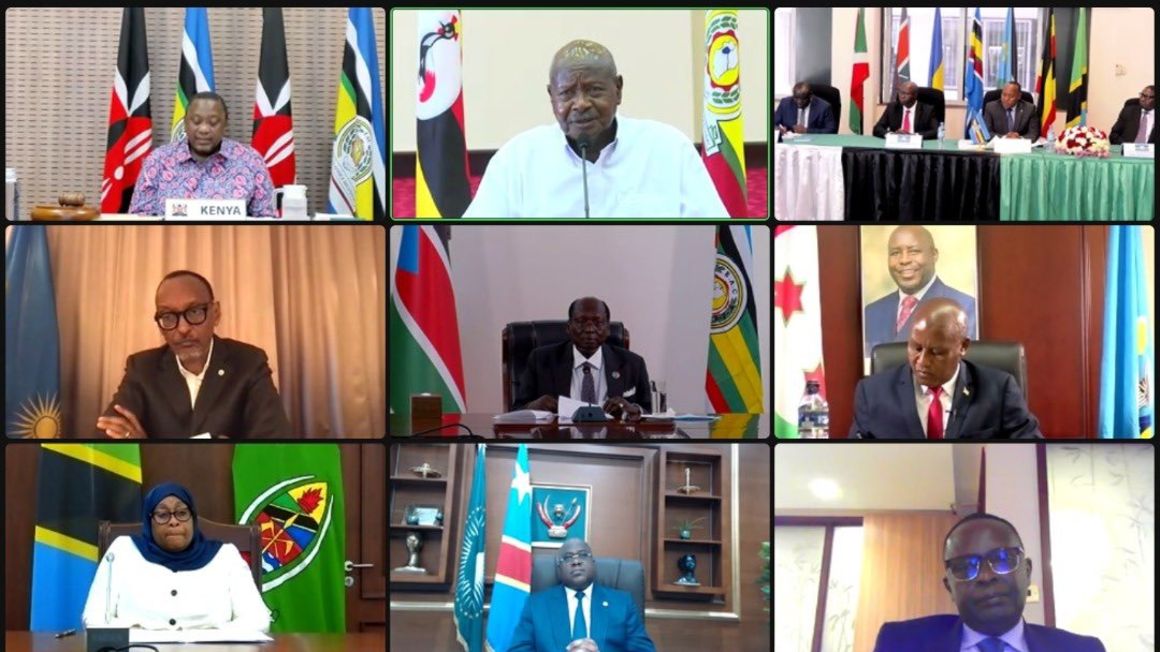
Virtual EAC Heads of State Summit. PHOTO | EAC Twitter accountBy Zephania Ubwani
Arusha. The East African Community (EAC) is now one of the leading trading blocs in Africa, thanks to the entry of DR Congo yesterday.
The expanded bloc is now third ranked among the eight economic communities in Africa in terms of the number of consumers
Vast DRC, with a population nearing 100 million, became the seventh member of EAC, boosting the region’s population to 280 million.
EAC now trails the Common Market for Eastern and Southern Africa (Comesa) and the Economic Community of West African States (Ecowas).
Comesa has a market of 406 million people, followed by 349 million in the 15 member Ecowas.
In terms of consumer market, the EAC is slightly ahead of the Southern African Development Community (Sadc) but more than double the population of other blocs.
Statistics indicated in Gross Domestic Product (GDP) - purchasing power parity - EAC is ranked fifth among the eight economic blocs in Africa.
But, with the entry of resource-rich DRC into the EAC, the enlarged economic group is likely to trail only Ecowas and the Arab Maghreb Union (AMU) in this segment.
In nominal GDP, DR Congo’s admission to the EAC has raised the combined GDP of the region to $ 280 billion from the current $220 billion.
DR Congo became a seventh member of the EAC yesterday in a move set to expand the market of the latter’s products.
DRC, on its part, targets to attract investments for its huge and largely untapped natural resources; forests, water and minerals.
The regional leaders unanimously agreed to admit the vast country into the bloc, fully optimistic of the economic gains of the expansion.
“With DRC, intra-EAC trade could reach our target of 25 percent from the current 15 percent,” said the secretary general Peter Mathuki.
He told a hybrid press conference in Arusha after the summit that only 11 percent of what is consumed now in DRC was from the EA bloc.
With a population of 95 million (nearly 100 million), the giant country would provide a sure market for products from East Africa.
DR Congo, noted for its poorly developed industrial sector and transport infrastructure, is set to benefit from investments.
“This is a momentous occasion for EAC economic integration. We are expanding our market size to 300 million people,” he said.
With 2.3 million square kilometres, DRC now overtakes Tanzania (947,000km square) as the largest and most populous country in the bloc.
Its entry as the new member would upgrade the region’s nominal gross domestic product (GDP) from $193 billion to $240 billion.
The population of the expanded bloc will rise to 275 million, making EAC third ranked economic bloc in Africa in terms of number of consumers.
Despite sharing borders with five EAC members- Tanzania, Burundi, Rwanda, Uganda and South Sudan, trade between the DRC and its neighbours has been surprisingly low. Over the last seven years, the proportion of EAC exports to the DRC has averaged only 13.5 percent.
EAC Chair President Uhuru Kenyatta of Kenya said DR Congo admission was yet another attempt by the region to create wealth.
The move would also open up transport corridors to the ports of Dar es Salaam and Mombasa for the largely land-locked country.
DRC President Felix Tshishekedi described his country’s entry into the bloc as a historic event of great significance.
President Samia Suluhu Hassan lauded the EAC secretariat for meticulously coordinating the entry of DRC into the bloc.
President Yoweri Kaguta Museveni of Uganda said the move would address the security challenges in the Great Lakes Region.
President Paul Kagame of Rwanda said DRC’s membership in the Community was in line with the quest “for a wider economic bloc”.
Burundi leader Evariste Ndayishimiye was represented by his vice president Prosper Bazombaza who said expanded EAC was key to stability.
EAC secretariat officials said DRC will be required to sign the Accession agreement by April 14th this year and forwarded to the Parliament.
The Parliament in Kinshasa must ratify this, paving the way for the country to deposit the instruments of ratification to the EAC secretary general by September 29.

No comments:
Post a Comment